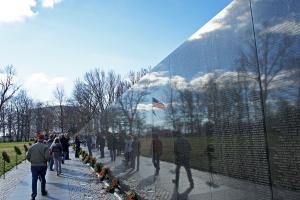| Contribute a translation | Source (English) |
|---|---|
Some twenty-five hundred years ago the prophet Jeremiah cried out with words filled pain and anguish words of despair words which might have come out of the mouths of our Vietnam veterans until today “Why have we been smitten?” he asked “and then for us there was no healing. We looked for peace but could find no good. We looked for a time of healing and behold we found terror.”[1] Cf. Jeremiah 8:15. | |
Adonai Eloheinu v’Elohei Avoteinu O Lord our god and god of generations past help us we pray: Make this the beginning of the time of healing that we all seek. Help us ease the terror and the pain of all who suffered because of war and help them and help us find the way to peace. | |
God, let this monument and this dedication forever remind us that we will come together to mourn our dead. We will come together to reach out to our wounded. We will come together to remember and to honor our brave. Only then may we have the vision to dream our dreams again. May we have the faith to pray our prayers again. May we have the courage to march along together again and together make this the kind of country and the kind of world for which we all pray. May we all join together and say, Amen. |
The Wall of Healing Prayer
Today, the Vietnam Veterans Memorial (”The Wall”) is one of our nation’s most beloved memorials. For many it is sacred space: holy ground. For me, it’s the closest America has to the Western Wall (the “Kotel”) in Jerusalem: a place for reflection and prayer; for remembrance and for dreams.
But for Jan Scruggs, the former Army corporal who first dreamed of this memorial, it was not easy to find support to remember a war that had divided our nation; not easy to remember veterans who had died, when we had never properly welcomed home those who had survived.
When Scruggs gathered together a group of veterans to promote the idea – a group that soon included me – there was opposition at every step: no memorial unless it glorified the war; or no memorial unless it admitted the war was a mistake.
Scruggs balanced these competing visions by not creating a Vietnam War Memorial at all; instead, the Vietnam Veterans Memorial would remember the men and women we had sent half-way around the world, many of whom had never made it back home.
Built to heal a nation the Wall would provide a place for all, regardless of feelings about the war, to come together to mourn our dead. And in so doing, to honor those who had survived as well: veterans who still bore the wounds – physical and emotional – of their service.
The Wall did that, and more. By honoring our veterans, it allowed them to tell their stories, and allow healing to begin. One veteran recalled how he had barely started college when a classmate asked him how he had lost his arm. When he told her he was wounded in Vietnam her response was “serves you right.” He never told anyone else he had been in Vietnam…until the day the memorial was dedicated.
Ultimately, what the memorial accomplished was a vision shift for people like that classmate. Before the dedication those who hated the war showed that hatred in their treatment of our military, so that our men and women had to fight two wars: one overseas and one back home. Since the Wall’s creation, most Americans carefully distinguish their opposition to a war from their support for our troops.
I remember being in uniform in an airport during Desert Shield/Desert Storm – when yellow ribbons were displayed as symbols of support for our military personnel. A stranger came up to me, extended his hand, and said “Welcome Home.” My first impulse was to tell him I had not served in DS/DS…but instead I grasped his hand and thanked him. I believed that I was finally being welcomed home from Vietnam.
The Vietnam Veterans Memorial helped our veterans, but it had an impact on us all. It changed the way we thought, and so it changed the way we acted, too.
These thoughts drove the prayer I offered at its dedication, thirty years ago. My prayer began by describing suffering: “Almighty God, some 2,500 years ago the prophet Jeremiah cried out with words filled with pain and anguish…words which might have come out of the mouths of our Vietnam veterans, struggling to reclaim their lives…until today. “Why have we been smitten?” he asked, ‘and then for us there was no healing….”
But the prayer ended with hope: “Help us, we pray, make this the beginning of the time of healing that we all seek…. Let this monument and this dedication forever remind us that we will come together to mourn our dead; we will come together to reach out to our wounded; we will come together…to remember and honor our brave.”
As we commemorate Veterans Day this year, may we join together to reaffirm the words of that prayer.
Rabbi Arnold E. Resnicoff served in Vietnam August 1969-August 1970 as communications officer onboard USS Hunterdon County (LST-838) in the rivers of Vietnam’s Mekong Delta, as part of Operation Game Warden. His Navy career included more than 28 years on active duty, the final 25 as a chaplain.
Source(s)
Notes
| 1 | Cf. Jeremiah 8:15. |
|---|

“Prayer at the Dedication of the Vietnam Veterans Memorial by Rabbi Arnold Resnicoff on 13 November 1982” is shared through the Open Siddur Project with a Creative Commons Attribution-ShareAlike 4.0 International copyleft license.









Leave a Reply